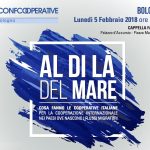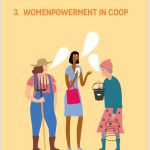Coopermondo has started an exchange of experiences in the field of cooperativism and associativity in partnership with the Agency for Reincorporation and Normalization (ARN), which is dedicated to the reintegration into Colombian society of demobilized persons from armed groups in the margin of the law.
The week of February 5 to 11 Coopermondo has been in the Cauca Region where it has visited the community of Ortega, made up of 120 families dedicated to coffee production. Fernando Bragado, Coordinator of Coopermondo in Colombia, states: “In this recognition phase, the associative initiatives of Ortega are being visited to identify opportunities to be strengthened as well as identify where it is possible to articulate institutional offers.” Additionally, he shared with the group the experiences of the agreements with SENA in the department of Valle and the impact it has had on the Vallecaucanos peasants.
During the visit, a recognition of the territory was made by the delegates of Coopermondo, representatives of the ARN, the Departmental Committee of Coffee Growers and the International Organization for Migration – IOM. The tour of the area was guided by Eymer Muñoz, Technician of the Departmental Committee of Coffee Growers, allowing visitors to learn about the production processes of the 13 lots of coffee crops and the associative work that has been carried out so far in the community of the Ortega corregimiento.
In addition, the tour allowed the delegates of the different organizations to visit the estate of Mr. Pedro Quina, one of the oldest associates of the area, who completed his reintegration process, and today manages to cultivate together with his 4 children more than 1,000 coffee plants, achieving recognition in the community for their discipline and product excellence. In the territory it was identified that the hectares of coffee crops are divided by families of people in the process of reintegration, each one belonging to between 1 and 2.5 hectares.
The community initiative in Ortega – Cajibío, is one of the pioneering projects in Colombia within the framework of the reintegration process, Ángela María Medina, Coordinator of the ARN Cauca Territorial Group, said: “The articulated work between the community and the support of the institutionality , has generated great opportunities from the process of reintegration that have resulted in benefits in the productive associative processes of Ortega coffee growers ».
The Italian NGO, Coopermondo, seeks to promote sustainable economic and social development through the creation of new cooperatives at international level. In Colombia, it has signed 4 agreements with the SENA and offers technical assistance in the training of trainers in associative issues. It also has 18 pilot programs in corregimientos of Cauca and Valle del Cauca.
Taking into account Coopermondo’s extensive experience in cooperative issues, the ARN explained the work carried out in the corregimiento of Ortega with a population in the process of reintegration, in order to exchange experiences and evaluate the possibility of working together with the SENA, in such a way that it is possible to train the population and obtain more effective results in terms of production and associativity.
(Adapted from reintegración.gov.co)
The week of February 5 to 11 Coopermondo has been in the Cauca Region where it has visited the community of Ortega, made up of 120 families dedicated to coffee production. Fernando Bragado, Coordinator of Coopermondo in Colombia, states: “In this recognition phase, the associative initiatives of Ortega are being visited to identify opportunities to be strengthened as well as identify where it is possible to articulate institutional offers.” Additionally, he shared with the group the experiences of the agreements with SENA in the department of Valle and the impact it has had on the Vallecaucanos peasants.
During the visit, a recognition of the territory was made by the delegates of Coopermondo, representatives of the ARN, the Departmental Committee of Coffee Growers and the International Organization for Migration – IOM. The tour of the area was guided by Eymer Muñoz, Technician of the Departmental Committee of Coffee Growers, allowing visitors to learn about the production processes of the 13 lots of coffee crops and the associative work that has been carried out so far in the community of the Ortega corregimiento.
In addition, the tour allowed the delegates of the different organizations to visit the estate of Mr. Pedro Quina, one of the oldest associates of the area, who completed his reintegration process, and today manages to cultivate together with his 4 children more than 1,000 coffee plants, achieving recognition in the community for their discipline and product excellence. In the territory it was identified that the hectares of coffee crops are divided by families of people in the process of reintegration, each one belonging to between 1 and 2.5 hectares.
The community initiative in Ortega – Cajibío, is one of the pioneering projects in Colombia within the framework of the reintegration process, Ángela María Medina, Coordinator of the ARN Cauca Territorial Group, said: “The articulated work between the community and the support of the institutionality , has generated great opportunities from the process of reintegration that have resulted in benefits in the productive associative processes of Ortega coffee growers ».
The Italian NGO, Coopermondo, seeks to promote sustainable economic and social development through the creation of new cooperatives at international level. In Colombia, it has signed 4 agreements with the SENA and offers technical assistance in the training of trainers in associative issues. It also has 18 pilot programs in corregimientos of Cauca and Valle del Cauca.
Taking into account Coopermondo’s extensive experience in cooperative issues, the ARN explained the work carried out in the corregimiento of Ortega with a population in the process of reintegration, in order to exchange experiences and evaluate the possibility of working together with the SENA, in such a way that it is possible to train the population and obtain more effective results in terms of production and associativity.
(Adapted from reintegración.gov.co)



